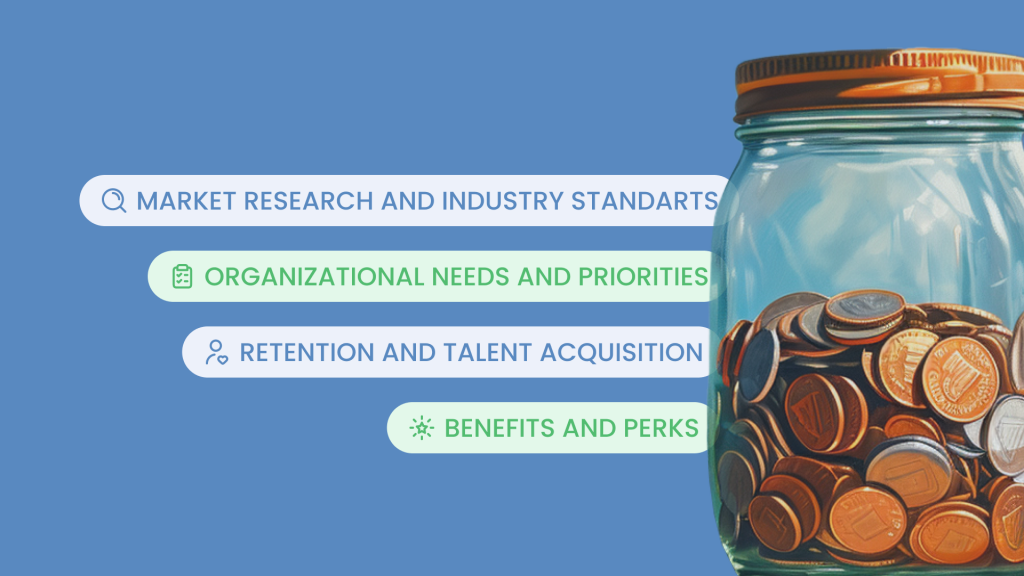Paying your employees is one of the most important expenses your company incurs. However, it’s not always as straightforward as paying out a base salary. You need to consider the cost of recruitment, variable pay, deductions and fluctuations in market rate so your recruitment strategies can remain competitive.
This is where a detailed salary budget comes in. This strategic outline helps account for all the expenses associated with maintaining (and growing) your workforce. It’s an essential part of any organization’s roadmap, and needs to be carefully considered with present expenses and future opportunities balanced together.
Here’s everything you need to know about the cost of recruitment, tracking and implementing a salary budget, and what technology you can lean on to help the process.
What is a Salary Budget?
Before we dive right into the guide, let’s get to know the basics of a salary budget. For HR professionals, a salary budget serves as the foundational financial plan outlining how much you expect to spend on employee compensation for a defined period (often aligning with the fiscal year). This budget outlines how your organization’s financial resources dedicated to the cost of recruitment, salaries, wages, bonuses, and other employee-related expenses will be spent.
Key components of a salary budget
Base salaries: These are the fixed amount of money allocated for roles at your organization, and represent the core of employee compensation.
Variable pay: This deals with bonuses, incentives, commissions, and any other form of performance-based pay that may vary based on individual or team achievements.
Benefits and perquisites: In addition to direct monetary compensation, a salary budget often includes provisions for employee benefits such as health insurance, retirement contributions, and other perks.
Payroll taxes: Tax-based deductions also need to be considered. These expenses related to employer-paid taxes are critical to consider when setting your overall salary budget.
Salary adjustments: You’ll need to account for periodic adjustments, whether they’re cost-of-living increases, merit-based raises, or adjustments to remain competitive in the job market.
A well-defined salary budget is one of the single-most important steps your HR department can take each year. Accounting for predictable costs while leaving room for cost of recruitment and flexibility will help you attract and retain talent, ensuring everyone is adequately compensated and employee satisfaction.
Learn more: Recruitment Fees Explained: Types of Structures You Can Expect
Why is Having a Salary Budget Important?
As mentioned, one of the biggest expenses for an organization is paying the salaries of its employees. Ensuring fair compensation fosters an engaged and motivated workforce. Thus, establishing a salary budget is crucial. Delve deeper into the significance of a salary budget with the following reasons:
Financial Control and Predictability
- Financial stability: A salary budget provides a structured framework for allocating resources, helping establish stability in your organization’s financial landscape. It also allows for better control over spending related to employee compensation.
- Budget predictability: Having a well-defined salary budget allows your organization to predict and plan for labor costs, which minimizes financial surprises and helps with financial forecasting.
Talent attraction and retention
- Competitive compensation: A well-crafted salary budget guarantees that your organization remains competitive in the job market. It enables you to attract top-tier talent by offering salaries and benefits that meet industry standards, and appeal to high-value candidates.
- Retention strategies: This involves allocating funds within your organization for salary adjustments, bonuses and benefits aimed at enhancing employee satisfaction and employee retention. Consequently, investing in such expenditures fosters organizational continuity, reduces turnover rates, and mitigates recruitment costs associated with talent replacement.
Performance alignment
- Linking performance to compensation: A salary budget serves as the mechanism which links individual and team performance to compensation. This encourages employees to strive for excellence, knowing that their efforts are recognized and rewarded.
- Merit-based adjustments: The budget allows for performance-based salary adjustments, acknowledging and incentivizing high-performing members of your team, contributing to a performance-driven company culture within your organization.
Strategic Workforce Planning
- Resource allocation: Your organization can strategically allocate resources based on its business priorities. For example, a salary budget could include provisions for targeted hires or additional training to address specific skill gaps within your workforce.
- Long-term planning: It also aids in long-term workforce planning by considering factors such as succession planning, skill development, and workforce expansion.
Cost Management and Compliance
- Cost containment: By defining and managing your labor costs, a salary budget helps your organization manage its overall budget effectively and accurately. It also allows for adjustments in response to changing financial circumstances, such as a market downturn.
- Compliance with regulations: Your salary budget helps maintain compliance with labor laws and regulations related to compensation (such as minimum wage or overtime pay) preventing any legal issues that could arise if there were salary disputes.
Organizational Transparency and Employee Morale
- Transparency: A clear and communicated salary budget fosters transparency in the organization. Employees are aware of the criteria for salary adjustments and bonus allocations, promoting a sense of fairness.
- Morale boost: Knowing that the organization has a structured approach to compensation increases employee engagement and morale. It establishes a sense of trust and fairness in the employer-employee relationship.
In short, a salary budget is essential for proficient financial management, talent strategy, and overall success, spanning short and long-term objectives. It ensures alignment of financial resources with strategic goals, accounts for the cost of recruitment, and cultivates a harmonious and prosperous work environment.

What to Consider When Creating a Salary Budget?
Developing a comprehensive salary budget requires a careful and detail-oriented approach, particularly when approaching elements that directly impact your organization’s success and your employee well-being and financial security (like the cost of recruitment). Let’s take a closer look at the key aspects to focus on when crafting a salary budget.
Market research and industry standards
When approaching your salary budget creation, begin by taking a deep dive into market research in order to grasp the current industry standards and salary benchmarks. Look into compensation surveys, industry reports, cost of recruitment standards, and relevant market trends. This data should form your foundation for determining competitive and attractive salary ranges that resonate with the broader market.
Analyzing competitor salary structures and understanding the average compensation for similar roles in the industry will provide valuable insights, and give you a keener understanding of the cost of recruitment you can expect. This step also ensures that your organization remains competitive and will attract top talent.
Organizational Needs and Priorities
Aligning the salary budget with your organizational needs and priorities should be your top priority. Consider the strategic objectives and overarching goals of your company, and consider—if there are imminent plans for growth, allocate budget resources accordingly, making sure that the salary budget supports these strategic initiatives.
This step involves a careful consideration of your organization’s mission and vision, company values, and strategic plans. For example, if its focus is on innovation, the salary budget might need to account for attracting specialized talent in cutting-edge fields, which could potentially increase the overall cost of recruitment.
Benefits and Perks
Beyond basic salary figures, your overall compensation packages probably include perks and benefits. Delve into structuring a comprehensive benefits plan, including health insurance, retirement contributions, and additional perks. The aim with this step is to create an enticing package that goes beyond monetary considerations.
Consider the specific needs and preferences of your workforce. For example, younger demographics like Gen Z and Gen Alpha might place a higher value on professional development opportunities, while a more senior team member might prioritize retirement benefits.
Retention and Talent Acquisition
A strategic salary budget should address both talent retention and the cost of recruitment. Identify important positions for targeted retention efforts and allocate resources for competitive compensation packages. At the same time, set aside budgetary provisions for attracting new talent, especially if there are plans for expanding the workforce.
You’ll need to consider the turnover rates for key positions and understand the cost of losing valuable talent. A budget that recognizes and rewards loyalty while attracting new talents is essential for maintaining a dynamic and resilient team.
By taking a close look at aspects such as market research, organizational needs, benefits, and talent strategies, your organization can develop a salary budget that not only meets industry standards but also supports the attainment of its unique objectives and enhances workforce dynamics.
Useful Tools for Preparing and Tracking Your Salary Budget
Considering the significance of a salary budget, it requires meticulous attention to detail. However, this complexity can be significantly simplified with the aid of tools and technologies accessible to HR professionals. Your team can utilize various software solutions to improve accuracy, efficiency and overall ease in managing your salary budget. Here are some useful tools for the task:
HRIS (Human Resources Information System)
An HRIS is a fully integrated system that facilitates the management of employee data, including payroll and compensation information. It automates many different HR processes, helping you communicate seamlessly between different HR functions. HRIS tools provide a centralized platform for payroll, making budget preparation (like predicting the cost of recruitment) and tracking a much more simplified task.
Budgeting software
Dedicated budgeting software offers robust features specifically designed for financial planning and analysis. These tools often include tools for salary budgeting, allowing your team to allocate funds for the cost of recruitment, set salary structures, and monitor expenditures. Modern HR budgeting software can also provide forecasting capabilities for future budget cycles.
Microsoft Excel
While considered traditional, Microsoft Excel remains a versatile and extensively utilized tool for budgeting functions in many businesses. While not as specialized as dedicated HRIS or budgeting software, Microsoft Excel allows HR professionals to create detailed and customizable salary budget templates. It’s also particularly useful for small to medium-sized businesses that may not require an extensive software solution (or lack the budget for one).
Compensation benchmarking tools
Compensation benchmarking tools can help your organization compare its salary structure against industry standards and competitors. These tools provide valuable insights into the cost of recruitment for specific roles, enabling your team to make data-driven decisions when preparing your salary budget. Some tools also offer real-time updates on market trends, helping you stay ahead of the game and make changes to stay competitive.
Selecting the right combination of tools depends on the unique needs and scale of your organization. If you work for a larger enterprise, you might benefit from a comprehensive HRIS and budgeting software solutions. If you’re a smaller business, you may find Microsoft Excel and specialized compensation benchmarking tools to be cost-effective alternatives. Regardless of the size of your organization, integrating technology into the salary budgeting process maximizes precision, agility, and assists with strategic decision-making.
Read next: Tools and Tips for Building an HR Budget
Unlock Smart Salary Budgeting with Omni

Affordable, functional, and suitable for modern growing businesses— Omni is the payroll provider that your business can rely on when creating your salary budget. Our comprehensive payroll solution is specifically crafted to meet the unique requirements of your business, regardless of your geographical location.
With product features like local currency support, automated tax calculations, and instant payroll reports, HR teams can simplify their salary budgeting process while ensuring adherence to regulatory standards. What’s more, Omni provides clear and timely insights into your organization’s spending, helping you build and audit your salary budget backed by real data.
If you’re ready to take your salary budget implementation to the next level, book a demo with us today. We’ll walk you through the platform’s features and demonstrate how Omni can transform your processes, saving you time, reducing administrative burden, and enhancing overall efficiency for your team.


